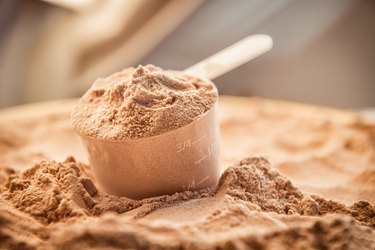
When you're on the hunt for an easy way to top up your protein intake, whey protein may be a convenient choice. If you have a dairy intolerance, you may be hesitant to consume a supplement derived from milk. You may find, however, that certain types of whey protein don't affect you and are perfectly safe to consume.
The Deal on Dairy Intolerance
Video of the Day
Dairy intolerance, or lactose intolerance, is a condition in which your body can't digest lactose -- the sugar found in many dairy products. This can lead to bloating, diarrhea and gas. Lactose intolerance occurs when your body doesn't produce enough of the enzyme lactase, which is responsible for breaking down lactose, so the lactose doesn't digest properly and becomes fermented.
Video of the Day
The Whey and Lactose Issue
Whey protein contains a relatively low amount of lactose, notes sports scientist Jim Stoppani, though whether you experience the same symptoms as you would with high-lactose foods depends on the level of severity of your intolerance. If you do consume whey protein, Stoppani suggests taking a lactase enzyme before drinking your shake.
A Better Option
If you do find that regular whey protein brings on intolerance symptoms, whey protein isolate is made in the same whey as normal whey -- usually referred to as whey protein concentrate -- but the nonprotein components are removed, resulting in a powder that contains very little lactose. Those with lactose intolerance may therefore be able to eat or drink products with whey protein isolate, reports dietitian Karen Giles-Smith.
Simple Switches
If you're having an adverse reaction to a particular type of whey protein, it could be other ingredients that are causing it, according to sports nutritionist Dr. John Berardi, so try switching brands. Alternatively, you could opt for another type of protein, such as rice, pea or egg protein. Always check with your doctor before introducing a supplement into your diet.